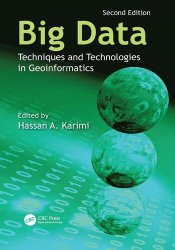 Название: Big dаta: Techniques and Technologies in Geoinformatics, 2nd Edition
Название: Big dаta: Techniques and Technologies in Geoinformatics, 2nd EditionАвтор: Hassan A. Karimi
Издательство: CRC Press
Год: 2025
Страниц: 410
Язык: английский
Формат: pdf (true)
Размер: 23.4 MB
Over the past decade, since the publication of the first edition, there have been new advances in solving complex geoinformatics problems. Advancements in computing power, computing platforms, mathematical models, statistical models, geospatial algorithms, and the availability of data in various domains, among other things, have aided in the automation of complex real-world tasks and decision-making that inherently rely on geospatial data. Of the many fields benefiting from these latest advancements, Machine Learning, particularly Deep Learning, virtual reality, and game engine, have increasingly gained the interest of many researchers and practitioners. This revised new edition provides up-to-date knowledge on the latest developments related to these three fields for solving geoinformatics problems.
When trying to understand the difference between Machine Learning and statistics, it is important to note that it is not so much the set of techniques and theories that are used but more importantly the intended use of the results. In fact, many of the underpinnings of Machine Learning are statistical in nature. When considering statistics, the main intent of statistics is gaining an understanding of the underlying system, in this case geospatial system, through an analysis of observations or data about the system. Here, the geostatistician or environmental modeler is interested in cause and effect in the underlying system and gaining a deeper understanding of the system itself. As a result of the need for environmental modelers and geostatisticians to gain an understanding of the underlying system, it is important that the eventual statistical model be interpretable, that is, not a black box. In fact, one reason for the limited use of Machine Learning algorithms has historically been exactly the lack of interpretability.
Machine Learning, on the other hand, is more focused on learning from observations of a system so as to be able to automate functionality. Here, the intention is not one of understanding but more one of engineering. For instance, in Machine Learning, a model may be trained so as to do automated
classification of new unlabeled observations, to forecast future observations of some system or automatically spot anomalous events.
Geospatial Big Data present two opportunities for the increased use of Machine Learning in the geospatial analytics domain. First, geospatial Big Data have created a shift toward considering large amounts of data as a resource that can be used to add value to an organization. Second, by virtue of the three Vs, volume, velocity, and variety, of Big Data, there is a shift away from complex models that require extensive computational and memory resources to techniques that instead can produce results in a more computationally efficient manner.
Features:
Contains a comprehensive collection of advanced Big Data approaches, techniques, and technologies for geoinformatics problems
Provides seven new chapters on Deep Learning models, algorithms, and structures, including a new chapter on how spatial metaverse is used to build immersive realistic virtual experiences
Presents information on how Deep Learning is used for solving real-world geoinformatics problems
This book is intended for researchers, academics, professionals, and students in such fields as computing and information, civil and environmental engineering, environmental sciences, geosciences, geology, geography, and urban studies.
Скачать Big dаta: Techniques and Technologies in Geoinformatics, 2nd Edition